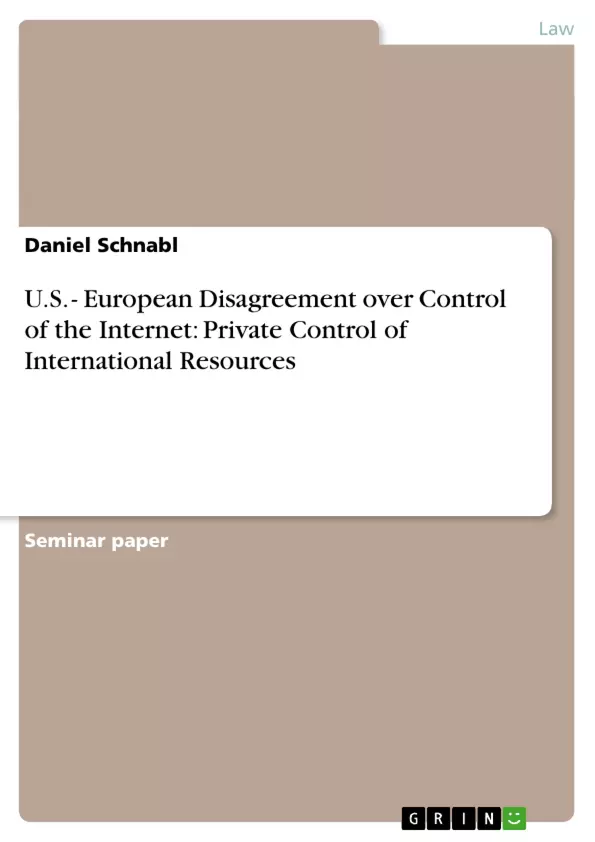Die Arbeit befasst sich mit der Inhaltskontrolle im Internet und vergleicht die Rechtslage in Deutschland mit der in den Vereinigten Staaten. Es geht dabei insbesondere um die Frage, welche Inhalte in beiden Ländern strafrechtlich sanktioniert sind und inwieweit die grenzüberschreitende Natur des Internets die Unterschiede beider Rechtsordnungen relativiert. Verfassungsrechtliche Unterschiede zwischen Deutschland und den USA werden in diesem Zusammenhang ebenfalls beleuchtet. Der zweite Teil der Arbeit untersucht Fragen des Domain Name Systems und seiner Kontrolle durch ICANN. Die Arbeit wurde im Rahmen eines gemeinsamen Seminars der University of Miami School of Law und der Juristenfakultät der Universität Leipzig erstellt und ist daher in englischer Sprache verfasst.
Inhaltsverzeichnis (Table of Contents)
- A. INTRODUCTION.
- B. MAIN PART............
- I. Control of Contents published on the Internet
- 1. Control of Contents in the United States.
- a) Attempts to Regulate the Internet through Legislation.
- aa) The Communications Decency Act (CDA).
- bb) The "Child Online Protection Act” (COPA).
- cc) Regulation through State Law
- b) Other Attempts to Regulate Contents on the Internet.
- aa) The "CyberTipline".
- bb) The "Innocent Images Task Force".
- cc) Regulation by the Provider
- c) Summary
- 2. Control of Contents in Germany.
- a) Constitutional Background – Art. 5 GG....
- aa) Legislation............
- (1) The "Teledienstegesetz” (TDG) and the "Mediendienstestaatsvertrag❞ (MDStV)......
- Legal Dispute over Legislative Competence
- The TDG
- The MDStV.......
- Delimitation Problems
- cc) Penal Provisions according to the German Criminal Code (Strafgesetzbuch, StGB)....
- Art. 130 StGB - Agitation of the People...
- Art. 131 StGB - Glorification of Violence
- Art. 184 StGB - Dissemination of Pornographic Writings
- Other Penal Provisions according to the StGB.
- Applicability of the German Penal Code
- dd) The "Gesetz über die Verbreitung jugendgefährdender Schriften und Medieninhalte\" (GjSM)...
- ee) The "Jugendmedienschutz-Staatsvertrag\" (JMStV).
- ff) The New Jugendschutzgesetz (JuSchG)..\n
- b) Other Attempts to Regulate Contents on the Internet..\n
- aa) Jugendschutz.net...\n
- bb) ,,Freiwillige Selbstkontrolle Multimedia-Dienstanbieter e. V.\" (FSM)\n
- c) Summary
- 3. Conclusion....
- II. Control and Administration of Domains
- 1. Legitimacy of ICANN.
- a) Technical Aspects of the Domain Name System
- b) The Carter Coal Doctrine .....
- c) Possibilities to Regain the Power...\n
- The Administrative Procedure Act (APA)
- Point of View of the European Union.…......
- The 5th Amendment to the Memorandum of Understanding...\n
- 2. Administration of Domain Names...\n
- 3. Frontiers of the Technical Mandate
- Content regulation and censorship on the Internet
- Constitutional and legal frameworks for online freedom of expression
- International cooperation and conflict in Internet governance
- The role of private organizations in managing global infrastructure
- The impact of US and European policies on Internet users worldwide
- The introduction provides an overview of the topic and outlines the main arguments presented in the paper.
- The first chapter examines the approaches to content regulation in the United States. This chapter explores various legislation, including the Communications Decency Act and the Child Online Protection Act, as well as other methods of control, such as the CyberTipline and the Innocent Images Task Force.
- The second chapter analyzes content regulation in Germany, focusing on the constitutional background, relevant legislation, and penal provisions. This chapter also discusses initiatives such as Jugendschutz.net and the "Freiwillige Selbstkontrolle Multimedia-Dienstanbieter e. V." (FSM).
- The third chapter explores the legitimacy of ICANN and the technical aspects of the Domain Name System. This chapter examines the Carter Coal Doctrine, potential avenues for regaining control, and the Administrative Procedure Act.
- The final chapter (not included in this preview) delves into the administrative aspects of domain names and the boundaries of ICANN's technical mandate.
Zielsetzung und Themenschwerpunkte (Objectives and Key Themes)
This seminar paper examines the disagreement between the United States and Europe over the control of the Internet, focusing specifically on the issue of private control of international resources. The paper aims to analyze the legal and constitutional frameworks governing content regulation and domain name administration in both regions.
Zusammenfassung der Kapitel (Chapter Summaries)
Schlüsselwörter (Keywords)
The key terms and focus topics explored in this paper include Internet governance, content regulation, freedom of expression, international law, constitutional law, domain name administration, ICANN, and the US-European disagreement over control of the Internet.
Frequently Asked Questions
What are the main differences between the US and Germany regarding Internet content control?
The US focuses on legislative attempts like the CDA and COPA, often balanced against the First Amendment. Germany utilizes specific laws like the TDG, MDStV, and strict penal codes (StGB) regarding agitation, violence, and pornography.
What is ICANN and why is its legitimacy debated?
ICANN is a private organization that manages the Domain Name System (DNS). Its legitimacy is questioned due to its private nature controlling international resources and its historical ties to the US government.
How does the German "Strafgesetzbuch" (StGB) apply to the Internet?
Specific provisions such as Art. 130 (Agitation of the People) and Art. 184 (Pornography) are applied to online content, establishing legal consequences for illegal dissemination within German jurisdiction.
What was the "Communications Decency Act" (CDA)?
The CDA was an early US legislative attempt to regulate "indecent" material on the Internet, much of which was later struck down by the Supreme Court for infringing on free speech.
What role do organizations like FSM and Jugendschutz.net play in Germany?
They represent "voluntary self-regulation" (Freiwillige Selbstkontrolle), where industry providers and state-affiliated bodies work together to monitor content and protect minors online.
- Quote paper
- Daniel Schnabl (Author), 2003, U.S. - European Disagreement over Control of the Internet: Private Control of International Resources, Munich, GRIN Verlag, https://www.grin.com/document/15871



